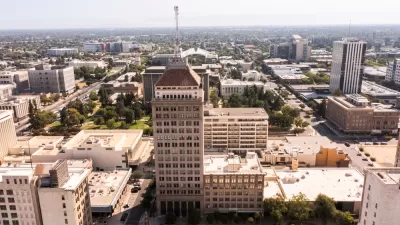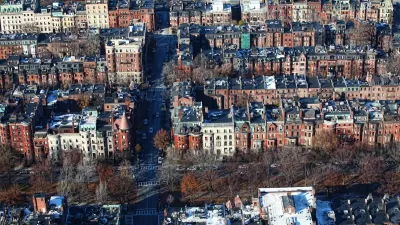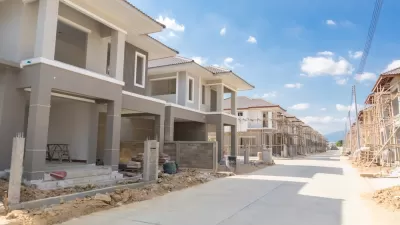Fresno's skyrocketing housing costs and inadequate supply are putting strain on the city's low-income households.

While the housing market in many parts of the country took a hit during the pandemic, Fresno's developers saw a spike in demand, making the Central Valley city "the nation’s hottest housing market." Since 2017, Fresno has seen the country's largest rent increases, reports Liam Dillon in the Los Angeles Times. "California’s fifth-biggest city, it’s an agricultural powerhouse on the doorstep of Yosemite National Park but often is thought of as a highway rest stop midway between Los Angeles and the Bay Area."
Yet in the last four years, "average rent for homes in Fresno is up nearly 39% to $1,289 a month," including a 12% increase during the COVID-19 pandemic—"the opposite of what has occurred in Los Angeles, San Jose and San Francisco, where rents have plummeted." In a city where more than a quarter of people live below the poverty line, the rising housing costs "have become a crushing burden to the region’s tens of thousands of low-income families." Despite more people moving out than moving into the city in 202, Fresno's housing prices have continued to rise. "Many blue-collar and service workers and farmworkers who lost their jobs amid the pandemic are facing possible eviction and feel trapped in substandard homes because higher costs elsewhere make it impossible for them to leave."
"Local politicians and housing advocates say the situation is the result of gaps and failures in the city’s housing market that have built up over decades and have yet to be reformed after the mortgage foreclosure crisis nearly 15 years ago," writes Dillon. Despite the region's high rate of population growth, construction has been stagnant since the Great Recession. "The average home value in Fresno is now nearly $300,000, according to real estate firm Zillow, having risen almost as fast as rents over the last four years." With record low availability for rental units, "rental housing for tenants at all income levels is in extremely short supply." Estimates put Fresno's housing shortage at over 35,000 units, and low-income households are bearing the brunt of the crisis.
FULL STORY: The nation’s hottest housing market? Surprise — it’s Fresno

Maui's Vacation Rental Debate Turns Ugly
Verbal attacks, misinformation campaigns and fistfights plague a high-stakes debate to convert thousands of vacation rentals into long-term housing.

Planetizen Federal Action Tracker
A weekly monitor of how Trump’s orders and actions are impacting planners and planning in America.

In Urban Planning, AI Prompting Could be the New Design Thinking
Creativity has long been key to great urban design. What if we see AI as our new creative partner?

How Trump's HUD Budget Proposal Would Harm Homelessness Response
Experts say the change to the HUD budget would make it more difficult to identify people who are homeless and connect them with services, and to prevent homelessness.

The Vast Potential of the Right-of-Way
One writer argues that the space between two building faces is the most important element of the built environment.

Florida Seniors Face Rising Homelessness Risk
High housing costs are pushing more seniors, many of them on a fixed income, into homelessness.
Urban Design for Planners 1: Software Tools
This six-course series explores essential urban design concepts using open source software and equips planners with the tools they need to participate fully in the urban design process.
Planning for Universal Design
Learn the tools for implementing Universal Design in planning regulations.
Gallatin County Department of Planning & Community Development
Heyer Gruel & Associates PA
JM Goldson LLC
Mpact (founded as Rail~Volution)
City of Camden Redevelopment Agency
City of Astoria
Jefferson Parish Government
Camden Redevelopment Agency
City of Claremont





























